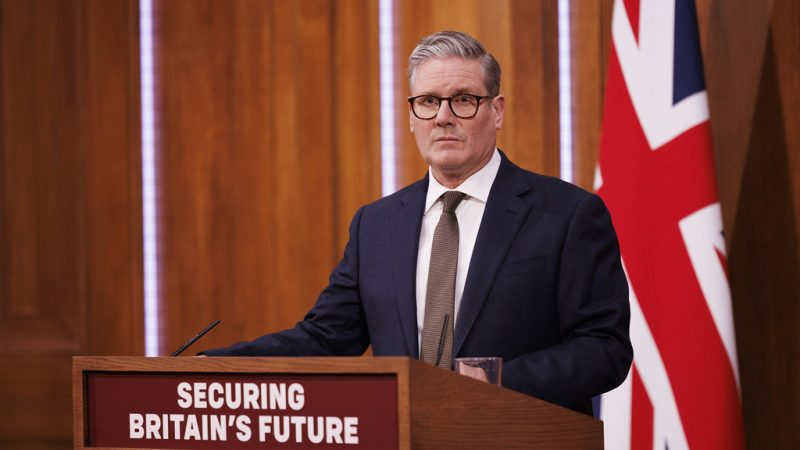
In the days when the spectre of Enoch Powell returned to haunt British politics again, it’s worth confronting the core of his argument head-on. Because the idea that Britain needs no one but itself – that real power comes from going it alone – is more wrong now than it was half a century ago.
Today’s world isn’t one of stable alliances or predictable threats. With war on the continent and an isolationist Washington it’s fragmented and fast-moving. And the things that really determine a nation’s power – the ability to defend yourself, secure your borders, ensure energy security and protect the integrity of your democracy – can’t be secured by wishful thinking or flag waving but by forging serious partnerships that make us stronger.
That’s the context in which the Prime Minister’s European summit today should be seen: not as some Europhile reset, but as a vital step towards rebuilding Britain’s strength in a world that punishes isolation. This isn’t about Europe. This is about power.
‘Reform will sell betrayal. Labour must sell sovereignty.’
Reform will want to fight the next election on a story of betrayal. Labour should fight it on a story of sovereignty. Because while many on the right and those who voted for Brexit may still be sceptical of ‘Europe,’ they’re not sceptical of control, security and stability.
The argument is easiest to make in defence. It’s just a fact that Britain cannot defend its interests in Europe, or project credible deterrence globally, on its own. Real sovereignty in today’s world requires collective capability, which means whether your systems, forces and strategies work alongside allies. But Europe’s defence landscape is deeply fragmented. This is most plainly illustrated by the fact that European countries operate 12 different main battle tanks, while the US has one.
In practice, in real conflict, this means even basic things – like repairing each other’s tanks, sharing ammunition, or coordinating joint operations – become harder, slower, and more expensive. Without pooling our procurement with our closest allies, the reality is our rising defence budget will deliver poor value and leave capability gaps unaddressed.
On migration, small boat crossings in the Channel have become a visceral symbol of a system that doesn’t work. But the reality is simple: by the time they reach the coast, it’s already too late. Britain is now outside the EU systems that enable early action – fingerprint matching, shared alerts, coordinated returns. One-off deals won’t fix something this complex. And politically, failure fuels a grievance machine. For parties like Reform UK, small boats aren’t just a problem – they’re a platform.
‘Cooperation is not a compromise’
The argument is harder to make in energy, but no less important. The UK cannot deliver long-term energy security on its own. Fossil fuel self-sufficiency is a fading fantasy, North Sea reserves are declining, new drilling would only make a marginal difference, and global capital is already shifting decisively toward clean energy. And while many voters are sceptical of net zero, they are not sceptical of cheaper bills, reliable power, or national security. Reframing the energy debate around security, not just climate, offers a route to the same outcome: a clean, stable energy system that works. But real resilience now depends on scale and that can only come through deeper cooperation with Europe.
On disinformation, although less discussed, the threat is just as real – and growing. It doesn’t arrive with tanks, but through feeds and falsehoods: undermining trust, inflaming division, and targeting democratic institutions from within. Britain has strong cyber capabilities, but they are deployed in isolation. We’re outside EU systems for early warning, election protection, and platform accountability. In today’s world, where domestic anger can be weaponised by hostile states, that isolation is a vulnerability.
‘Powell’s ghost and the myth of self-reliance’
This is the argument Labour should be making to voters who still feel bruised by Brexit but want Britain to be strong again. Not that Europe is the answer – but that going it alone isn’t.
Enoch Powell believed Britain stood strongest alone. He was wrong then. And he’s still wrong now.
Because in today’s world, strength comes from scale and control comes from cooperation. The Prime Minister’s deal with Europe today isn’t about reopening old debates. It’s a chance to start a new one – about what real power looks like in a volatile world, and how Britain gets it back.
Subscribe here to our daily newsletter roundup of all things Labour – and follow us on Bluesky, WhatsApp, Threads, X or Facebook.
- SHARE: If you have anything to share that we should be looking into or publishing about this story – or any other topic involving Labour– contact us (strictly anonymously if you wish) at [email protected].
- SUBSCRIBE: Sign up to LabourList’s morning email here for the best briefing on everything Labour, every weekday morning.
- DONATE: If you value our work, please chip in a few pounds a week and become one of our supporters, helping sustain and expand our coverage.
- PARTNER: If you or your organisation might be interested in partnering with us on sponsored events or projects, email [email protected].
- ADVERTISE: If your organisation would like to advertise or run sponsored pieces on LabourList‘s daily newsletter or website, contact our exclusive ad partners Total Politics at [email protected].




More from LabourList
‘What Batley and Spen taught me about standing up to divisive politics’
‘Security in the 21st century means more than just defence’
‘Better the devil you know’: what Gorton and Denton voters say about by-election